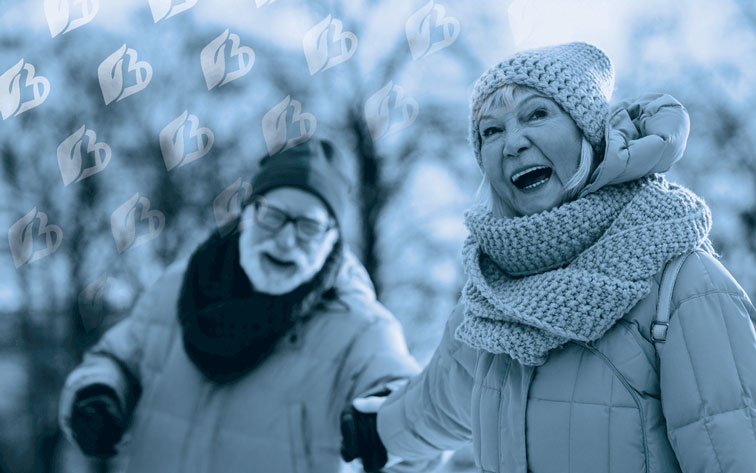Tips To Stay Safe During the Winter Months

This time of year brings colder temperatures and less sunlight during the winter months, which can affect seniors differently than when they were younger. Seniors over the age of 65 are more likely to develop hypothermia, so extra precautions should be taken to ensure their safety. It’s important for caregivers for loved ones know winter homecare tips and what to look for.
Start by adding layers
The first and most important step to take is adding layers of warm clothing. As seniors age, their bodies don’t retain body heat the same as when they were younger. By keeping the layers loose this allows body heat to circulate and keep their temperature up. This applies to staying indoors and well as being outside. When outside enjoying the fresh air, always remember to wear a hat and gloves. This keeps heat from escaping from the top of the head and exposed skin protected.
Hypothermia and what to look for
Oftentimes seniors aren’t aware that they are dangerously cold. Hypothermia occurs when the body temperature drops below 95 degrees and can cause heart attacks, liver problems, and kidney damage. Family member caregivers should know what signs and symptoms to look for to best protect their loved ones. Home care providers are specially trained in recognizing hypothermia and treating it effectively.
Early signs to look for are slowness, slurred speech, cold hands or feet, puffy face, and pale skin. Later signs include trouble walking, moving slowly, jerky movements with arms and legs, slow heartbeat, shallow breathing, and loss of consciousness.
Caregivers are often the first ones to notice symptoms, and it’s very common for seniors to be unaware of their condition. In this situation the best things to do are:
- Wrap blankets around the person in need
- Offer a warm beverage that does not contain alcohol or caffeine
- Do not put anything hot or warm directly on the skin
- Do not massage the body to warm it up
- Call an ambulance if the person in need does not improve
Staying warm with limited resources
It is not uncommon for many seniors to try to keep their heating bills lower by turning down the heat. A winter health tip from the National Institute on Aging recommends that older people keep their homes heated between 68-70 degrees, as hypothermia can set in at 65 degrees.
If keeping up with heating costs are difficult, it’s important for seniors to not endanger their health. There are options through state and local resources that assist seniors in staying healthy.
- LIHEAP (Low Income Home Energy Assistance Program) assists low-income homeowners and renters in helping heat and cool homes by making direct payments to utility companies.
- WAP (Weatherization Assistance Program) assists with repairs to heating and cooling systems, insulating water pipes, insulating attics, and walls, and sealing doors and windows with weather stripping or caulking.
- Many local electric and gas companies offer programs to keep monthly payments the same based on total 12-month usage. This allows for consistent financial budgeting between seasons of higher or reduced usage.
Winter mental health tips
Mental health is just as important as physical health, especially in the winter. Getting outside once a day for a change of scenery and fresh air can help with feelings of loneliness. Sitting near windows (as long as there is not a draft) can provide light and sunshine which helps feelings of depression.
A home care agency can provide medical care as well as companionship for seniors, while also relieving the burden for family members. Caregivers are dedicated to creating meaningful bonds with clients and their families, offering tailored care plans that best benefit individuals’ healthcare needs. There are many caregiver resources available so you can see if that’s the right option for you and your family.





